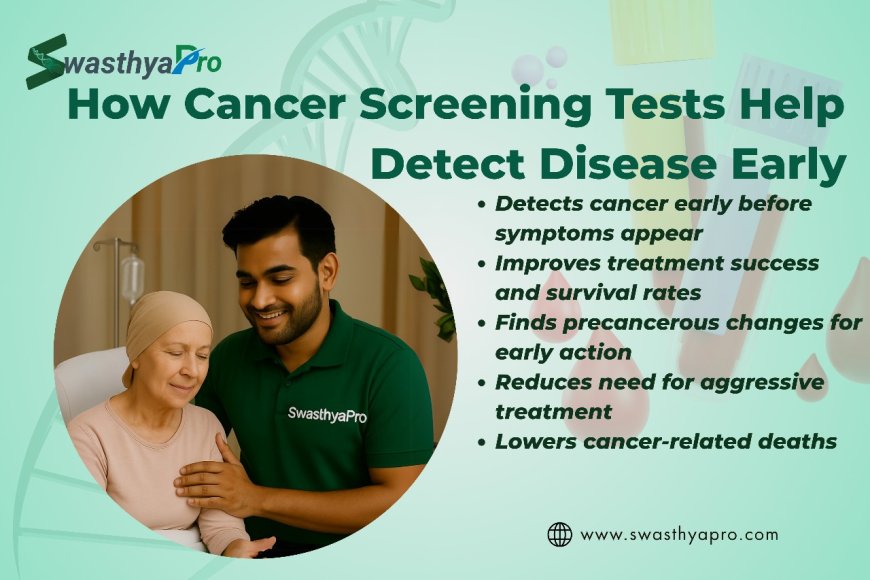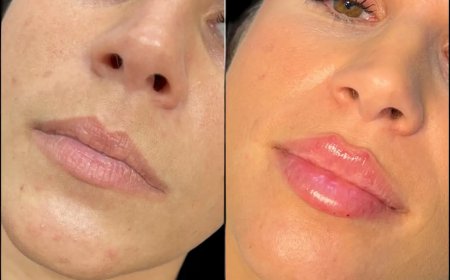What a Cancer Screening Test Can Reveal Before Symptoms Even Begin

Cancer is one of the few diseases that can grow silently for years until it strikes when you least expect it. Thats why a cancer screening test is so important. It has the unique ability to detect cancer before you feel a single symptom. This gives you a critical advantage: time.
In this article, well explore exactly what a cancer screening test can reveal, how it works beneath the surface, and why early detection is often the key to survival.
1. Cellular Changes Before Tumors Form
Many types of cancer begin with abnormal cellular changes. A cancer screening test like the Pap smear or HPV test can detect these changes in the cervix before any tumor develops.
-
These aren't cancer yet but theyre warning signs.
-
Early detection allows for monitoring, lifestyle changes, or treatment to prevent progression.
This is the power of a cancer screening test: it finds the problem before the body shows you there is one.
2. Pre-Cancerous Growths (Polyps, Lesions, Nodules)
Some cancers start as non-cancerous growths that can turn dangerous over time. A colonoscopy, for instance, identifies and removes polyps small growths in the colon that may develop into colorectal cancer.
-
A cancer screening test allows for instant intervention:
Polyp seen ? polyp removed ? cancer prevented. -
Similarly, skin and oral screenings can catch lesions that look harmless but are precursors to cancer.
These findings help prevent cancer entirely not just detect it.
3. Hidden Blood or Internal Inflammation
Some cancer screening tests, like the Fecal Immunochemical Test (FIT), can detect occult (hidden) blood in stool a possible sign of bleeding in the gastrointestinal tract due to colon cancer.
Other tests may pick up:
-
Traces of blood in urine
-
Elevated white blood cells
-
Hormone imbalances or unusual protein levels (like PSA in prostate screening)
These arent symptoms youd notice without lab testing, but a good cancer screening test brings them to light.
4. Tumors That Are Too Small to Feel
A mammogram can detect breast lumps or tumors far before they are large enough to be felt by hand. Similarly, a low-dose CT scan can find lung nodules as small as a grain of rice.
-
These tumors may be in their earliest stages.
-
At this stage, cancer is usually localized and highly treatable.
By the time you feel a lump, cancer may already be spreading. A cancer screening test often works silently, behind the scenes, to catch disease before it escalates.
5. Genetic or Viral Markers of Cancer Risk
Some cancer screening tests look not for tumors, but for genetic mutations or viruses that increase cancer risk.
-
BRCA gene testing: Can reveal genetic mutations linked to breast and ovarian cancer.
-
HPV testing: Detects the virus responsible for cervical and some throat cancers.
Even if cancer isnt present now, these screenings can inform lifestyle changes, preventive measures, and regular monitoring stopping cancer before it starts.
6. Tracking Cancer Trends Over Time
For people at higher risk, a cancer screening test can track biological markers over time. For example:
-
PSA levels for prostate cancer
-
CA-125 levels for ovarian cancer
-
CEA for colorectal or pancreatic cancers
Consistent screening allows doctors to compare results over time, spotting trends before they turn into health emergencies.
7. Early-Stage, Asymptomatic Cancer
The most life-changing benefit of a cancer screening test is that it can detect Stage 0 or Stage I cancer when it's most curable and often symptom-free.
Examples include:
-
Ductal carcinoma in situ (DCIS) in breast cancer
-
Cervical intraepithelial neoplasia (CIN) in cervical cancer
-
Early prostate cancers found only through PSA elevation
These cancers dont yet show pain, fatigue, or weight loss but they can still be removed or treated with minimal invasion.
Final Thoughts
A cancer screening test is like turning the lights on in a dark room. You may not see the threat now, but that doesnt mean it isnt growing. Screenings give you the ability to:
? Act before symptoms start
? Remove threats before they evolve
? Plan your health journey with confidence
? Turn fear into facts and facts into power
Dont wait to feel unwell. Cancer doesnt knock. It creeps. And your best chance to stop it is while its still whispering.
Book your cancer screening test today. Because silence isnt safety its a test you dont want to fail.



































